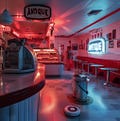21.
Monique held up the mascara brush, grinning bigger than her glimmering braces. “I’ve never done a White girl’s face.”
“You’re a friend for trying,” said Milly.
“How do you want your eyes?”
“What does Bette Davis look like?”
Monique found a photo on her pad. “Wow! And your hair looks like Jean Harlow …”
Without a subscription their decision to listen to old, free music fit them
🎵 “Looker” – Kim Carnes 🎵
“All done, Milly. The girls are waiting. You want lipstick?” This was their big night out.
She shook her head.
“What about lip gloss?”
Milly tried it. “It looks like water!” Her lip trembled.
“Geez, Milly, it’s just lip gloss.”
“I grew up in the desert.”
“Careful — mascara will run.”
Milly pressed the corner of her eye to stop a tear.
Monique fanned her dry with an old, paper Sudoku puzzle book. She finished with blush, then handed over the lip gloss. “Keep it.”
Milly smiled, then plucked her thrift-store blouse with a frown. “But I look like a business lady.” They’d saved up their meager allowances.
“No, Milly.” Monique held up the mirror. “You look like a model.”
She swished her hair and posed: tilted head, wide eyes, pushed lips. “Like a magazine?”
“Look out!” Monique laughed. “Where’d you learn that? Hope you make it back by curfew!”
Their clique of misfits had formed by winter break, around Milly, for protection.
“We heard you were a badass,” one said.
Milly stared. “I don’t know what that means.”
“Summer school?”
“Leave it,” Monique said to the girl.
Milly wore a black pencil skirt, hemmed at the knee, barely compliant with the modesty ordinance. The nearest VR theater, owned by a family corporation, actually enforced such rules — even in Salt Lake. The thin bangle on Milly’s left wrist was a gift from the thrift store checkout lady.
There was still time after the movie for a scoop at Antique Ice Creamery.
As Milly sat down, the girls erupted with laughter. “Why’d you order extra?”
“I didn’t.” Milly’s cone nearly fell over. She looked at the counter; the counter boy looked away.
Her friends finished and waited outside.
Milly tossed her cone in the garbage, having eaten less than half.
The boy was cleaning, ready to close up. “Didn’t you like your ice cream?” They were alone.
“It was delicious.” Milly dabbed her napkin. “Just too much sugar.”
Walking closer, she locked eyes with him. Milly slid behind the counter, right up to the boy. In her pumps, she stood as tall as he did.
He froze.
Without blinking, she said, “You gave me much more than the other girls — on purpose.”
“Am I in t-t-trouble? Are you”—his voice cracked—“the boss’s daughter or something?”
“Not anymore.” She blinked.
“What does that mean?”
“Are you scared?”
He nodded.
Milly tossed her napkin into the trashcan by his feet. “Thank you.” She squeezed his shoulder. “You’re cute. I’ll see you again.” Milly walked outside to her giggling friends without looking back.
He shook in relief.
She saw that boy several times: pulling him into the back room when there were no customers, pushing him against a freezer, pulling him closer when he had to leave, and leaving herself when he wouldn’t.
What a fool, that boy.




